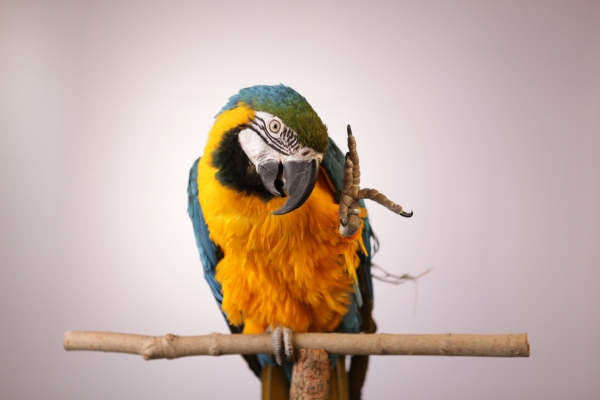
No one knows for sure how many parrots are kept as pets in the U.S. — maybe 10-40 million — but we’re about to learn one thing: Thousands of them lose their homes each year and thousands more desperately need to leave their current situation.
On Wednesday November 13, PBS NATURE will premiere Parrot Confidential, the story of these intelligent, social, still-wild birds and their plight when a home with humans doesn’t work out.
Most parrots have successful relationships with their owners. This is the untold story of the failures. Jamie McLeod of Santa Barbara Bird Sanctuary explains, “People will say, ‘I want a bird that talks, that’s quiet, and that doesn’t bite.’ And that species has not yet been discovered.” As a result, she says, “People typically keep parrots 2-4 years. The birds live 80 years. Crunch those numbers out and there’s a lot of unwanted parrots out there.”
There are many reasons why a parrot-human relationship sours despite everyone’s best intentions. The birds are highly social and demand lots of interaction and stimulation; in the wild they would never be alone. Parrots take several years to become sexually mature and when they do they choose a mate. In the absence of their own species they choose a member of the household, sometimes treating the rest of the family with aggression. Changes in the human and pet family structure can trigger a parrot upset: the death of a loved one or addition of a new family member. Some birds cope with stress by screaming, plucking and biting.
Unfortunately when a parrot needs a new home there aren’t enough shelters. Some birds are emotionally scarred and go out for adoption over and over again. The stories are sad but there are bright spots in the show to warm your heart:
- There are dedicated parrot owners who love their birds and work to find what’s best for them.
- The rescuers are real heroes. Some have saved hundreds of parrots.
- Some rescued parrots find a soul-mate of their own species at the shelter.
- Because scarlet macaws are endangered in the wild, the ARA Project breeds rescued macaws in Costa Rica and releases their offspring to the forest.
I shed a few tears for the parrots, but partly for joy at the scarlet macaws flying free in Costa Rica.
Don’t miss Parrot Confidential on PBS NATURE, November 13 at 8:00pm EST. In Pittsburgh watch it on WQED.
(photo of blue-and-gold macaw courtesy Joe Brunette/©2013 THIRTEEN Productions LLC)
p.s. See the comments for a discussion of parrot longevity.
Update on November 21: Watch the entire show online at the Parrot Confidential website.
Disturbing and very sad.
Minor point of contention, but that should read they can live *up to* 80 years.
Macaws are usually in the 30-50 year range, which is impressive enough, but you see 50-70 in the cockatoos. I once worked with a bird that was claimed to be 88, though.
Goodwolf, thanks. It’s a direct quote from the show in which Jamie McLeod explains why there are so many homeless parrots. It was going to be clumsy for me to footnote or alter the quote with the details of parrot longevity.
Later p.s.: See more comments (below) on parrot longevity from Jamie McLeod (Santa Barbara Bird Sanctuary) and Marc Johnson of Foster Parrots, both of whom were featured in the show.
Charlie (allegedly hatched c. 1899), also known as Charlie the Curser, is a female Blue-and-yellow macaw living at Heathfield Nurseries, a pet sanctuary in Reigate, Surrey, United Kingdom. Charlie became famous when The Daily Mirror published an article about her in January 2004.
The bird’s owner, Peter Oram, claims Charlie is over 100 years old.
Check out Cookie the Major Mitchell cockatoo still kickin at 80… http://www.suntimes.com/news/metro/20313429-418/seclusion-fits-cookie-the-cockatoo-just-fine.html
Wow, Jamie! Thanks for the info. I’m so impressed by your part in the show & your protection & advocacy for parrots. I’m glad PBS Nature is highlighting this important issue.
Dear Kate,
It has been our experience that macaws live longer than cockatoos but the jury is still out on any scientific data.
Marc, thanks for the info on macaws. Loved the story of Lou’s rescue and his eventual home at your parrot shelter in Rhode Island. (http://www.fosterparrots.com/).
Regarding the lifespan of the parrots, I spent many years managing a pet store that sold hand fed parrots. At that store, I met a lady who had lost her great grandmother’s yellow headed amazon. As far as she knew, the bird was around 125 years old at the time of it’s death.
This documentary was very touching and insightful. Thank you to everyone who worked on it.